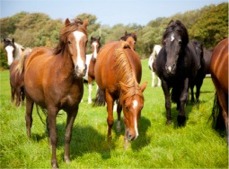Horses
 Horses are grazing animals (non-ruminant herbivores) and as such are designed to eat constantly. Their grass diet is low-energy and high fibre and the constant input ensures the gut is continually working. The caecum is far more sensitive than say a cow rumen and as such needs a natural diet as the microbial population is designed specifically for grass. A natural diet also avoids acid issues which can cause gastric ulcers.
Horses are grazing animals (non-ruminant herbivores) and as such are designed to eat constantly. Their grass diet is low-energy and high fibre and the constant input ensures the gut is continually working. The caecum is far more sensitive than say a cow rumen and as such needs a natural diet as the microbial population is designed specifically for grass. A natural diet also avoids acid issues which can cause gastric ulcers.
It is imperative that the soil’s fertility is correctly balanced so the grass plants supply the correct balance of nutrition in the horses’ diet. This will ensure that the horse’s immune system is optimised thus enabling it to resist infection. Fertility will also improve as the levels of selenium and vitamin E are correctly available ensuring more effective serving to the stallion and easier foaling with reduced occurrences of malpresentations / dystocia.
Grass sickness is prolific amongst the UK’s horses. This is a bacterial infection caused by chlostridium botulinum. Whilst at this stage Field Science Ltd cannot claim to eradicate the infection from pastures, we are confident that once the immune system is functioning correctly, the horse will be in a better position to resist infection from this bacterium.
Foals will develop correctly and grow faster, with strong bones (boron will enable far better utilisation of calcium by the body) and correct musculature.
The grass will grow evenly, with far less need for synthetic fertiliser (if any!).
Fungal attack to the grass plants will be reduced as the plant too has an optimised immune system so it is able to resist infection from fungal attack. The fungal poisons (mycotoxins) in grass plants have been associated with poor fertility in both sheep and cattle. We see no reason why this is not the case in horses, so to be able to prevent this is paramount.
As always, the most important trace element to a horse is selenium. It plays a major role in developing and maintaining the musculature, in disease resistance and in optimising fertility.
It would appear that there are many substitutes for ‘good old grass’ in the equine industry. In the United States over 51% of horses are overweight (interestingly 64% of American humans are overweight and 24% obese) and in the UK a similar situation is appearing with 32% overweight, compared to less than 10% fifteen years ago. This is because horses are fed supplements and concentrates on a daily basis, in addition to their grazing diet. These are totally unnecessary, completely undermine the horse’s digestive capabilities and have developed as a result of paddocks being minerally-deficient and poorly managed.
Field Science tailor-made mineral dressings are applied to the paddocks, ensuring that the soil’s rootzone provides the grass plants with the correct balance of nutrients as and when required, through the soil as nature intended. Horses grazing this land will then acquire the correct balance of nutrients through their natural diet. When forage is correctly mineralised, the animal will feel replete sooner and will consequently eat less.
Overweight, laminitic, colic, excitable, troublesome horses will become a thing of the past.
Click Here to read an interesting article entitled 'My Horse Needs Minerals But Which Ones?' as featured on the Agricultural pages of the Government of Alberta's website.
